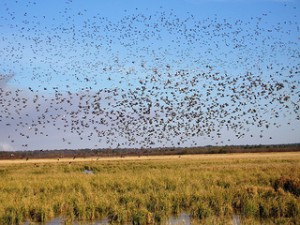Analyzing over 20 years of data, two researchers concluded that pesticide use, not habitat loss, was the most important factor contributing to widespread declines in populations of U.S. grassland birds.
|
|
|||
|
Did you know that United States permits the planting of genetically engineered crops in the nation’s protected wildlife refuges? Environmental groups have challenged this practice one region at a time. Genetically modified crops reinforce genetic homogeneity and promote large scale monocultures, they increase vulnerability of crops to climate change, pests and diseases and thus contribute to the decline in biodiversity. In the age where 75% of our plant genetic diversity has been lost, we must ask whether GMOs are doing more harm than good. Gold rush is a thing of the past. The name of the new game is “land grab”, where governments of developed nations and multinational companies are leasing or buying large tracks of land across the African continent and other countries around the world in a feverish rush to grow crops for food and bio-fuel. The Future of Food conference can be neatly summed up by this timeless aphorism uttered by Mahatma Gandhi: You must be the change you want to see in the world. Let’s get to work! When Barak Obama was elected, many in the sustainability movement believed that they finally had an ally in the White House. However, the President’s agricultural appointments tell a different story. In a world where sometimes it seems that our life is determined by someone or something else, it is refreshing to realize that your individual choice can and does make a profound difference. You can reduce environmental degradation by going vegetarian, or, at a minimum, by consuming less meat. |
|||
|
 |
|||





